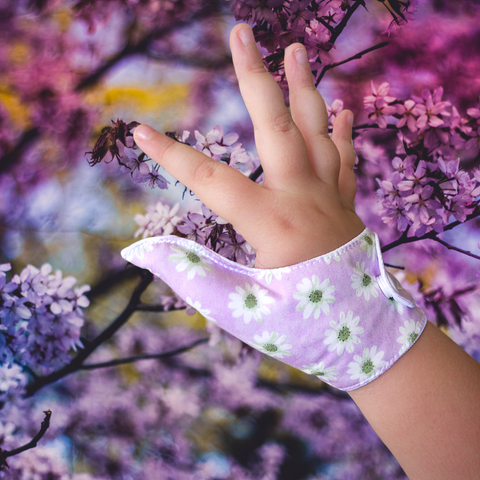Three things to consider before buying a thumb guard

Nature vs. Nurture -The Thumb Sucking Debate. Part Three
Age matters
The first thing to consider is the age of your child. As a business, you might expect me to say that all thumb-sucking babies and children require a thumb guard. However, while I certainly appreciate your custom, unless your baby's habit means he or she has developed blisters or an infection, there is honestly no need to intervene at this stage.
The truth is that over three-quarters of babies suck their thumbs or fingers during the first year of their life. Then, as they move past toddlerhood and into the preschool years, most children end the habit naturally. Therefore, if your little one is under two years, you need not concern yourself just yet. Unless there is a medical condition requiring a break from the habit, you should wait a while longer before purchasing our products. Rest assured, we will continue to make thumb guards in the smaller sizes, should circumstances change and your baby requires one.
Because of the social benefits of helping children break their sucking habits before starting school, we created our thumb guard with four-year-olds in mind. Additionally, at this age, children are old enough to understand when you explain why they should not suck their thumbs, but young enough, in most cases, not to have adult teeth emerging that can be damaged by the habit.
Did you know that not all thumb-sucking habits are the same?
I am a mother of eight. While all my children have been thumb suckers at one point, half only indulged in the practice occasionally and rarely in public. With those children, even when they did have their thumbs in their mouths, three appeared to rest them there but not actively suck. Interestingly, those children stopped thumb sucking naturally before school age. The fourth followed suit after a friendly chat with our dentist.
However, with our other four children, their thumb sucking methods were not the same as their siblings. They seemed more committed to the habit. I would describe two of them as vigorous thumb suckers who were not put off by social occasions. They sucked their thumbs with dedication, and it was their habits in part, that led to the introduction of our thumb guards (although it was already too late to prevent overbite developing for them)
Therefore I doubt it to be a coincidence that one child, who fiercely sucked their thumb, has already worn braces. The second has a severe overbite that now requires costly correction and, if it were not for the thumb guards, I am confident the younger two would be following suit.
Consider then how your child sucks their thumb. Are they actively sucking, or do they idly rest the thumb in their mouth? Remember, the more vigorously they suck, the greater the likelihood of dental problems later.
Emotional implications
Although it may not always seem obvious, emotional trauma, health issues, and insecurity are all influencing factors for thumb sucking. If your child has been affected by a recent case, such as bullying or the loss of a loved one, now may not be the right time to concern yourself about their thumb-sucking habit. If the practice began following a trauma, you may inadvertently increase their anxiety and upset by intervening. Allow your child the time to work through their current issues before gently discussing their habit with them.
The critical point to remember is that children who continue thumb sucking (past four years of age) have often developed a habit that has become deeply ingrained. You could describe it as an addiction or emotional crutch. The triggers that cause them to pop their thumb into their mouth are not dissimilar to those that prompt a smoker to reach for a cigarette. As it is with any addiction, threatening a consequence and nagging are unlikely to sway your child away from their thumb.
In summary
Don't force your child to go 'cold turkey.' Such actions may have the opposite effect. If your child is a comfort sucker, stress from being forced to stop thumb sucking will increase their desire to continue.
Success is more likely to come when your child feels in control, understands why they should quit, and has (with gentle encouragement) then decided to do so for themselves. This is the perfect time to show them our range of thumb guards, allowing them to choose the design they would most like to wear.
If your child is not yet old enough to make the choice to stop thumb sucking, but there are health grounds for helping them end the habit, go ahead and order you thumb guards. The guards will still help, but you may be met with some battles to begin with.